#the specifics there get more speculative but The Guilt and whatnot
Explore tagged Tumblr posts
Text

its both!!!!! it is so so important that their motives here were Both
#ABSOLUTELY the main motive was wanting to help. they loved their family and wanted to free everyone#and likely also felt the pressure to do so due to the prophecy#However. i do think their desire for revenge was important too and honestly i really do not understand why this is seen negatively#like. i get it. i still get really upset about things that happened 17 years ago#i get it. this is important to me#i feel like now i am just projecting#but i do really think that that aspect of their character is really important and shouldn’t be overlooked or even really viewed negatively#i think the third and arguably biggest overarching motive however was just that they were very unwell#the specifics there get more speculative but The Guilt and whatnot#i know it well (<- projecting again)
1 note
·
View note
Note
So RWBY/Justice League is apparently a crossover that's actually going to happen. Of the little we know right now, how do you think that's going to pan out?
Anonymous said: Those questions about Superman and Batman in RWBY seem prescient, because I'm hearing that an official crossover is in the works
Anonymous said: Um, so there's a legit Justice League/RWBY crossover coming
Anonymous said: So, that official DC/RWBY crossover, huh?
Anonymous said: So, how about that DC/RWBY cross, eh?
Anonymous said: No more speculating how Superman would fit into RWBY when DC themselves are providing their own answer XD
The immediate thing that leaps out beyond the Kingdom Hearts* level of utterly out of nowhere berserk this premise is: while the RWBY comic had a couple minor sequel hooks, and I don’t know how it did in its original digital chapters or in trade, as a monthly periodical it was selling poorly enough that DC didn’t bother to print its last physical issue after the return from the Coronavirus shutdown, and while I thought it was great a lot of fans complained about its art and characterization throughout. I hoped for that sequel, sure, but I wasn’t expecting the book to be regarded internally as anything but a sales failure, nevermind not only continuing it but tripling down in the most extreme and bizarrely specific way possible that’s neither intuitive (unless you have special interests like me) nor surface-level ridiculous enough like Batman/Elmer Fudd that people will buy it just to see how it works. I don’t understand why this comic is happening when no one but me wanted this.

(* The Kingdom Hearts comparison is apt because they were similarly close to the top of things I’d love to see cross over with the DCU that would obviously never, ever happen because that’s too precise and random a combination of my interests. Even if this is legally possible where that isn’t, that would still be conceptually simpler.)
I was asked a couple times in the past about how Superman or Batman could make sense in RWBY’s setting, and it turns out I was closer with the latter than the former - that rather than a dimension-hopping traditional crossover, this is reverse-engineering what the assorted members of the League would look like if they had always been part of Remnant ala JLA/Planetary, some of the old DC/Marvel crossovers, or the more recent Batman/The Shadow. Which actually fits really well with the series regularly evoking assorted fairy tales and mythologies with their characters; this bunch is just one more set to be added. Though that raises several more thoughts and questions:
* The solicit refers to them as Clark Kent, Bruce Wayne, and Diana Prince, but will they actually be referred to as such in the story, and will people comment on them not fitting with the color-based naming conventions of that world? Or will they be renamed and evoke their sources purely through iconography, ala Ruby not literally being Little Red Riding Hood?
* How much will the origins of the assorted characters be changed? Batman, Cyborg, and Aquaman would all make perfect sense within the ‘rules’ of the setting with few major alterations, but will Superman still be from Krypton and Green Lantern a space ranger, or will they simply be ordinary humans with thematically reminiscent backstories and Semblances/weapons that evoke the classic powers? I think the latter could work, but I imagine the former is more likely (even if Bennett might keep it vague on some of the details to preserve the aura of mystique and avoid changing the shape of the world too radically) simply because everyone’s surely aware that fans would complain about being ‘ripped off’ for getting the characters ‘in name only’ otherwise.
* Speaking of changes to fit the setting, between being a Faunus and the apparent low-tech traditional armor look of his suit, is Bruce Wayne in here not operating from a position of wealth? You’d just think as a given the Wayne family would be easily plopped in as business rivals to the Schnees and Alfred would be on a first name basis with Klein, but it seems Bennett might have something very different in mind. Also, little disappointing he simply has a katana rather than those collapsible batarangs that turn into swords that Ellis always gave him which would fit perfectly here. And, as so many have already asked: how miserable is he every second of every day in a world where everything is also a gun. At least this isn’t a universe where anyone’s gonna think he’s irresponsible for training teenage sidekicks.
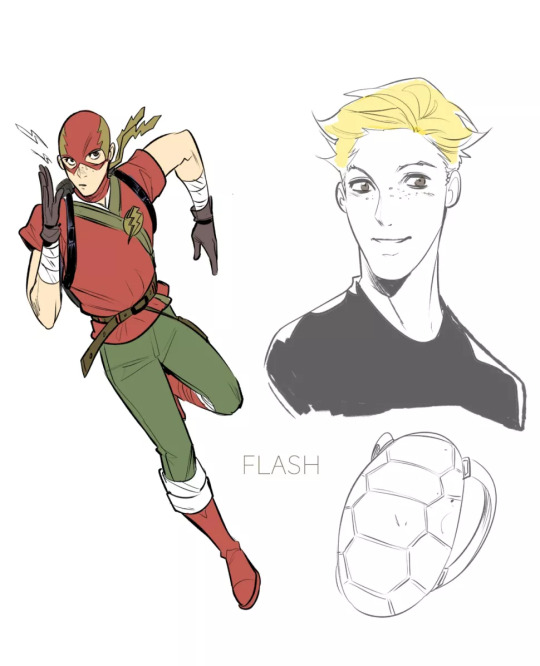
* And if we’re going into individual characters: RWBY Barry Allen is adorable, what the hell. He just looks so dopey and hapless, I sure hope he doesn’t ever have to die to stop the Anti-Monitor. We’re definitely getting a meeting with Harriet that retcons in that he’s the other person with a speed Semblance she mentioned running into, and if he’s tapping into the Speed Force then the jokes that that’s what Harriet does are probably gonna become at least a little bit canon.
* Are the Themyscirans magic, given all magic has a very important common root in this world?
* I don’t think there’s a dud redesign in the bunch? These are all really inspired in their own ways, which is good because unlikely as it seems this is I believe the first time we’ve really gotten any sort of official interpretation of “here’s what the DCU would look like as a Shonen���. Go ahead and say the hell with it and make it Earth 28, I’ve thought before making that an anime Earth would fit with the map.
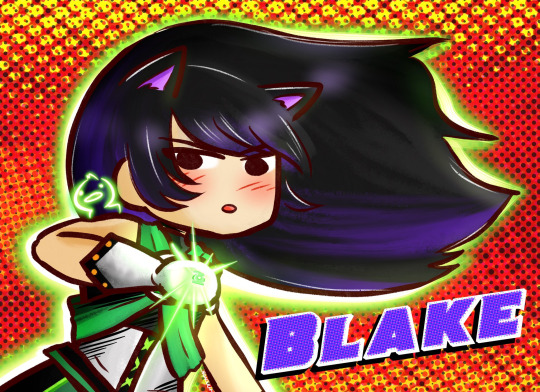
(By Ag_Nonsuch)
* Bunch of obvious ways these characters can play off of each other: Ruby is paralleled with Wonder Woman on the cover, and I’m curious how Bennett will play that, but she makes most sense next to Flash, a super-fast fan made good, or Superman, a character she so deeply if unintentionally evokes on so many levels I felt I had to make clear when describing her that I didn’t solely appreciate her as a psuedo-Superman analogue. Weiss makes sense up against Batman either as a wealthy heir or a Faunus who’s likely faced his share of pain from the Schees who either way are cold perfectionists defined by inner pain stemming from their families, or Wonder Woman/Aquaman as fellow ‘royalty’. Yang is paralleled with Superman on the cover and that makes sense with the two country bruisers with issues regarding their lost parents, though she’d also make sense with Aquaman as the ‘temperamental’ members a lot of the time of their respective teams, or Cyborg as they both deal with their relationships with their bodies after requiring prosthesis. And Blake pretty much has her pick: like Superman she uses an article of clothing to ‘pass’ and shares the commitment to justice, she and Batman are dark children of privilege (or not in this case, though in this world they’re both Faunus), she and Wonder Woman both left the island homes where their people were safe to try and make the rest of the world better, she and Aquaman are both Faunus royalty, and Green Lantern is about overcoming great fear and in Jessica Cruz’s case specifically about the guilt of running away.
* Will this be entirely flashbacks to the pre-series/Beacon years, or will those be flashbacks set from a ‘present’, and if so when? What happened between the siege of Haven and the train setting off for Argus is the most loosely-defined period in the story and is right on the heels of the end of the original RWBY mini, so I’d imagine it fitting here. And given they apparently join together “to take on a force unlike anything they've seen before” rather than purely the character work of that previous book, what might that be?
* Hey, superhero comics/superpowers as an idea already exist in this universe, will that come up?
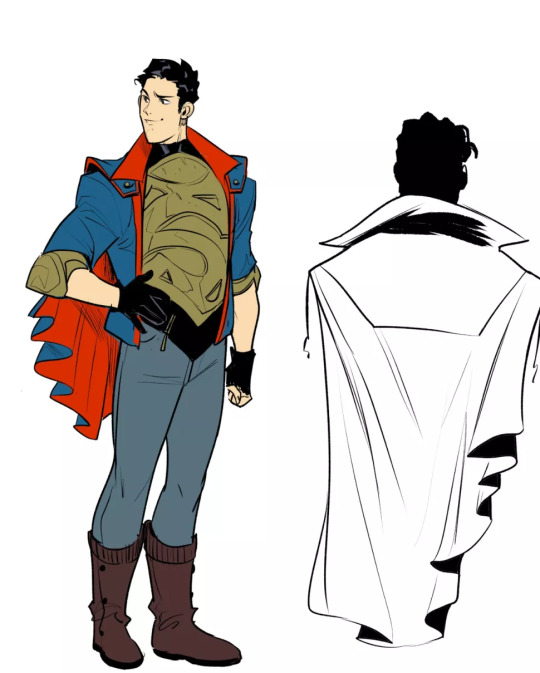
* If we can get one single scene in this and it’s going with a “yes they’re still aliens and magic and whatnot” premise I want Clark, who hasn’t thought of being Superman yet and therefore is still at least somewhat hiding his powers, being wracked with guilt over not pursuing becoming a Huntsman and therefore not being there at the Fall of Beacon. Which is a ridiculous thing to take the blame for, but of course he would, he’s Clark, culminating in trying to apologize to JNR for Pyrrha dying he feels in part because he was a coward (when they don’t even have the faintest concept for why he would think he should have been there or could have done anything).
* Once all’s said and done, how is their presence in the world justified as not being a factor in the series proper? It’s simple if they’re ‘ordinary’ analogues who can go off to quietly have adventures elsewhere, but if not then some of them either have to be shuffled off stage or presumably left with their stories incomplete, with a little afterward of “and they went on to be the greatest heroes of all...later, after the scope of team RWBY’s main adventures so that we never have to directly address them again” to avoid them becoming unavoidable major factors in the war against Salem.
In the end, will it be DC’s best comic? No, though I imagine one of their better ones this year. Will it be among the ones I look forward to most each month? Right up there with Yang and Reis’s Batman/Superman baby, this is a miracle freak of fate and I’m gonna appreciate the universe bending over backwards to make entertainment for me and me alone while it lasts. Given I finally checked out RWBY in the first place because I was curious about Bennett’s original comic, this is a heck of a full-circle moment.
#RWBY#Justice League#Batman#Flash#Wonder Woman#Superman#Green Lantern#Aquaman#Cyborg#Barry Allen#Jessica Cruz#Ruby Rose#Weiss Schnee#Blake Belladonna#Yang Xiao Long#JNPR#Marguerite Bennett#Aneke#Stephanie Pepper#Emanuela Lupacchino#Opinion
73 notes
·
View notes
Photo

Okay, I admit, I wasn’t tagged but I was in the mood to share some more trivia on “The Rebel’s Ascension”. So, here it is...
First, I want to thank the people who follow me around reading this fic. Every person how carves out a little time of their day and spends it on my story is an absolute blessing for me. Whenever I get a kudo or a comment on one of the chapters, it really makes my day! ♥︎
With that being said...
I’m very well aware that I’m writing a DA prequel/an origin story for Fen’Harel that nobody asked for. It’s a fic for lore nerds like myself, mostly. I has no romance and no smut, just a bit of brooding elf and and some angst. If anything, it’s a study of Solas’s character before he became burdened with guilt, and I’m enjoying it immensely.
Beyond that, there are a quite a few (tinfoily) theory-related things I wanted to include in the story. Because how would you write a story that is set in Elvhenan if you don’t include some wild speculations about how life was back then.
This was (and still is) the hardest part about the fic: to make it fit somewhat nicely with what we know about Elvhenan from codex entries in DA:I. Because, you know, I’m Captain Canon-Compliance. Something in my brain just refuses to divergent too much from the material that is handed to me by BioWare.
I won’t be able to include everything, of course. There is just too much to take into consideration, plus all the stuff that hasn’t been explained in the games. I narrowed it down to what we know about Solas’s past and the slave rebellion, and then tried to tie in more information on the Evanuris.
Here’s an incomplete list of things I cover in the story:
Solas’s past as Mythal’s servant/spy
Why he loves spirits so much
How he gets the name “Fen’Harel”
How and why he starts the slave rebellion
How he locked the Forgotten Ones in the Void
How he learns to remove the vallaslin
How he got the orb he used to create the Veil
How the Evanuris secured their reign over Elvhenan
Why the Forbidden Ones were banished
Some speculations on the origins of the Blight
Even more speculations on magic in the pre-Veil era
The magic system is really a mess, tbh. Since magic has no real limitations in Thedas, it’s really hard to describe it without making people ridiciously overpowered. This is a big problem in the DA novels, too, because the magic looks nice when you play the games but its just unrealisticly versatile and powerful in a written format. Anyone can do anything , which makes it incredibly hard to create real stakes for the protagonist.
In an era before the Veil, this problem multiplies because people could use magic like it was nothing. “Natural as breathing” and all that jazz. If I take the mindblast Solas conjures in “Trespasser” as an example (that scene in Fen’Harel’s sanctuary), a fight between two elvhen must have look like the boss fight in “Man of Steel”, with entire mountains crumbling and whatnot.
I dialed all of that down A LOT. There’s not much fighting in the story to begin with, to avoid this very problem, but it really messed with my mind while outlining. I prefer to write about characters and their complicated relationships so figuring out how to make them fight in an epic way without bulldozing half of Thedas was quite challenging, to say the least..
There you have it – a trivia info dump on this long fic. If you want to know any specifics or want to chat about elven lore, my ask box is open. :P
––––––
Tagging @serial-chillr and @faerieavalon because I know you are into the DA lore, too – but no pressure! ;) This is supposed to be fun!
22 notes
·
View notes
Text
Regarding Greta Thunberg's statements
*sigh* How do I put this so as not to sound like one of those far-right Yankee man-children?
I'm from a non-First-World country. Just like the vast majority of people in countries like mine and even in First World countries, I'm galaxies away from being a billionaire. I know first-hand how important and vital the much-despised "political class" actually is, as well as how much billionaires benefit from convincing people that getting rid of all politicians is the only and ultimate solution to all of society's ills. I'm well aware that we live in a world where a few mega-corporations each own more capital than multiple nations, those few progressive parties that manage to win elections are too busy trying to improve the quality of life of the many and they cannot be too radical in their fight against those corporations, maybe they even depend on them to even feed, heal and educate the people (unless we're talking about one of those far-left maggots who try to take power only to have their five minutes of fame, make fleeting and almost only symbolic advances easily undone by later governments subservient to the billionaires, and then become a footnote in history).
And it just irks me when naïve environmental activists with no practical knowledge of Politics say quite a lot of things that are technically 100% true, but they also criticize both the ultra-small billionaire minority -the only real culprits for the current climate crisis- and many other people who either try their best from their own place or have no power to stop or attenuate the climate change and just want to live their lives or are already worried about more immediate issues.
Sometimes environmentalists even ignore the scientific data to which they say we must pay attention. I don't question climate change or the fact that a few hundred billionaires are to blame for it (both have already been proven more than enough, both by science and by everyday life), but I do question the feasibility of the solutions proposed by activists themselves (only activists mostly, not even scientists). The majority of countries -even without the corporations' pressure- just can't even start in the first place a transition to environment-friendly energy sources without continuing to mine for lithium & copper or use agrochemicals & GMOs or extract natural gas -sometimes requiring fracking to do so- or use nuclear energy or do so many other things now labelled as taboo by Environmentalism.
If Greta Thunberg wishes so much to start a movement to incite world leaders to be more proactive in tackling climate change, then she must radically change her approach. Set her sights on the world's billionaire minority, pointing at them, calling out their names, instead of trying to guilt-trip 7.5 billion people. Invite the billions of people not belonging to that rich minority to build a political movement for social justice and against climate change, simply because almost all of us are its victims in one way or another. Collaborate with grassroots organizations but also with politicians and even economists, regardless of whether that makes her feel "impure" or "tainted", for that the economy isn't just the big private banks and hedge funds and financial speculation but also people's daily life, and no fight against climate change will be successful if the economy isn't also taken into account. Participate in Politics, demonstrate in the streets to denounce governments subservient to corporations but also to support progressive governments in their attempts to confront them, and allow like-minded political parties to join this movement, for that Democracy is much more than just electing representatives every few years and looking at them either having no intention or being unable to do anything. Not merely blame everyone and everything around, but seek and propose viable solutions to non-First-World peoples & institutions so that they can meet their needs without feeling guilty for the environment, convince the First World's average citizen to recognize themself as yet another victim of their own nation's elite, accept with open arms those First-World victims along with the rest of humanity, and gather support to ceaselessly pressure First World governments in international forums and later ceaselessly pressure transnational corporations through them, to make the latter finance any plan to combat climate change, since First World governments and specifically that ultra-rich minority are the only ones capable of making a real, tangible difference on their own. And finally, recognize this isn't a "millennials versus baby-boomers" thing, especially since that kind of irreconcilable generational divide happens mostly in the USA and is by no means a trait of human civilization as a whole (contrary to what the overwhelmingly majority presence of North-Americans might imply).
The communication methods of Greta Thunberg and so many other environmentalists only contribute to Fascism's growth and improve the public image of the billionaire minority, in two ways:
Rightful anger manipulated: the average citizen gets fed up with guilt-trip attempts, outright rejecting any concern for the environment, perhaps even adhering to conspiracy theories about climate change being a hoax and whatnot.
Nihilism & Eco-Fascism: the idea that all of us human beings are the real plague and have to sacrifice a lot of people (coincidentally, people of colour most of the time) is becoming more and more extended, along with the other idea that the only solution to the climate crisis and societal issues is to end civil liberties; it's not hard to see where this is going.
If Greta Thunberg doesn't plan to change the way she approaches climate change in her public appearances, she better call herself to silence, if only to give the floor to other activists of different origins, with more down-to-earth opinions and a true vocation to stop and repair the damage to the planet through the world's majorities' empowerment and the fight against outraging inequality.
#environmentalism#climate crisis#climate change#climate justice#greta thunberg#economics#inequality#critique
0 notes
Text
Below is my rambling response to @argnatien’s lovely review of 3.3k words (?!??!?!?) for LLSHP AU ch16~
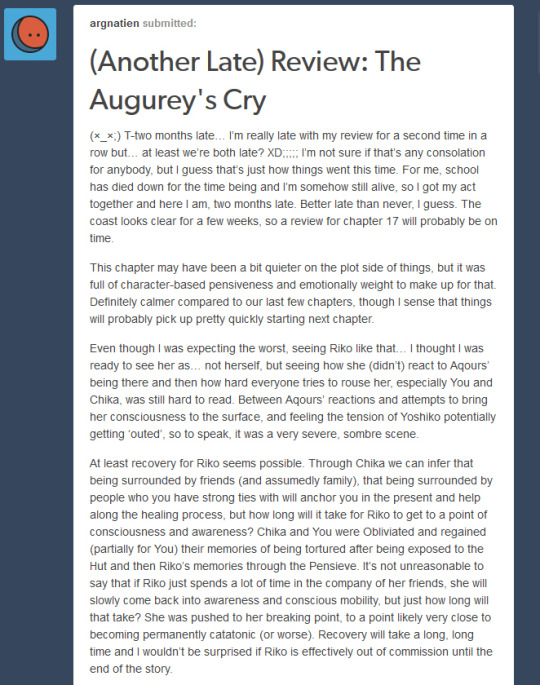
I had hoped to finish ch17 in February but oh, it’s April now XD;;; So I’m definitely way later than you. But! I’m still very happy to receive your feedback! Yes, I did intend this chapter to be ‘quieter’ in terms of actions, but definitely still a turmoil in terms of emotions. The thing with the ending chapters of Arc2 is that, the characters were not given time to truly absorb the aftermaths. Everything happened so quickly, back to back, and suddenly their world is turned upside down. It’s not just Yoshiko – Dia and Riko are abruptly gone from their peaceful school life. Chika and You learned about what really happened to them but they never got the chance to talk to Riko about it.
I think I mentioned this already, but I’ll stress again that, if it weren’t for the carbonado necklace, Riko would have ended up like Frank and Alice Longbottom. She was subjected to not just one but several Cruciatus Curses on top of many Legilimens. It was a difficult scene for me to write as well, though I still strive to be as realistic as possible given the circumstances.
Riko had immediately Obliviated You and Chika while their… ‘injuries’ were still fresh, so to speak, while it’s already too late for Riko. Her mind was broken already, so there’s no point in Obliviating them. Besides, messing with memories is a crude method to deal with Cruciatus aftermath – it’s not done in canon HP verse. Unlike physical torture, I believe Cruciatus to be a direct attack on the mind to stimulate pain receptors, rather than actual attack on the person’s nervous system. So, if the mind forgets that it ever sent such signals, perhaps there wouldn’t be an aftereffect. Of course, all of this is just my assumption and play around with HP canon material XD;
Back to present, Chika said that being surrounded by friends and family would remind her that the pain from Cruciatus is in the past. What Riko needs now certainly is time and, as the girls have discovered, Dia to be with her too. I can’t elaborate more on this point but indeed, there is hope. Hope is what Aqours is all about.
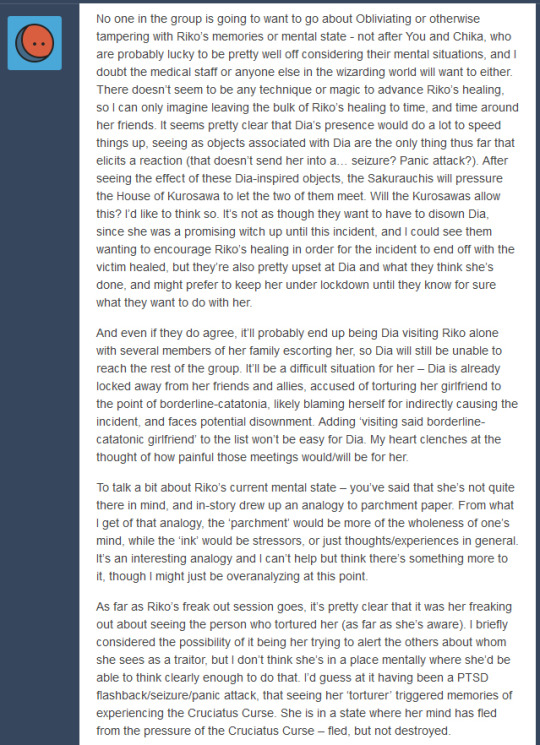
Dia was raised and shown in public as the heiress of the Kurosawa family. They could not just outright disown or strip her of her title for no reason, that would be even worse shame than the current suspicions she now faced. Hence the best countermeasure they have for now is to keep her from public eyes. There’s the matter of her relationship with Riko as well. Though the Sakurauchis is an old family with prominent background, their lineage is nowhere as pure as Kurosawas. Both women, different social status, and now this incident… Dia and Riko indeed face quite a lot of obstacles.
Grounded in her family home, unable to contact friends and left with only thoughts of guilt and regret, Dia’s not in a good state in many ways (as briefly shown in ch17). Dia is not privy to Riko’s condition, so her mind would just keep wandering and assuming the worst. As Dia-oshi (that’s hard to believe probably, considering what I’ve done), it’s difficult for me to imagine how much pain Dia’s been experiencing but had to keep inside her with no way to vent her stress.
My parchment paper analogy is my attempt to differentiate Magical healing from Muggle healing process. For Muggles, we have equipment like MRT scans, EGG scans etc. So, as I try to rationalize how Healers work, the parchment analogy came to mind. Ink is indeed the stressor and is unpredictable, as in what sort of stain the ink would make on the paper is dependent on how the ink is dropped upon it. Thoughts/experiences change the pattern that the ink runs on the paper. Chika and You mentioned how their minds are like ‘dried parchment, one that’s been stained before but the ink color has long lightened.’ So, just how can Riko’s ‘parchment’ be salvaged?
Yes, you’re correct, she was just having a PTSD flashback upon seeing the person who betrayed and tortured her. She had no idea it was ‘Yohane’ – she still thought it was Yoshiko. She definitely is in no state of mind to think about the why and how. ………… yeah, I deserve to be stoned by Riko-oshis.
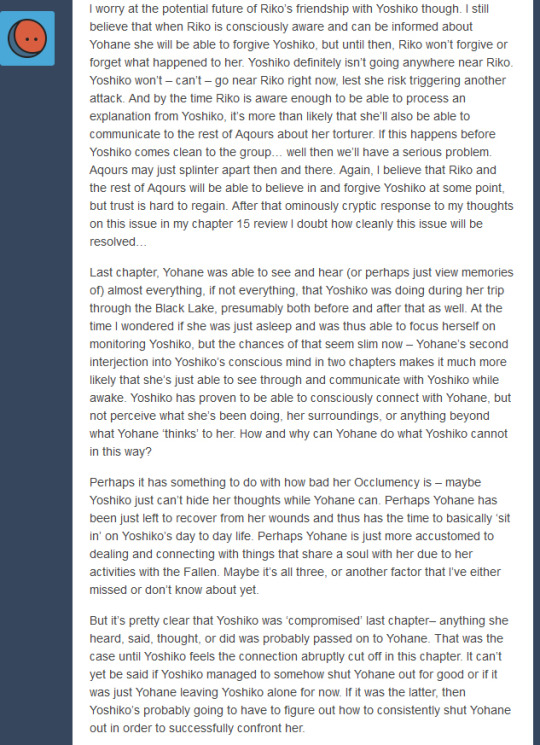
Hmm, yeah, can’t comment much on Yoshiko & Riko atm. But yes, Yoshiko will not go anywhere near Riko in fear of triggering another panic attack. I don’t remember what I said to you for ch15’s review LOL I agree, trust is indeed hard to regain.
Can’t comment much on the Yohane-Yoshiko connection either. Just as how Yoshiko can do certain things Yohane can’t (ie cast the Patronus), there are things Yohane can do that Yoshiko can’t either. The how and why shall be revealed in the remainder of Arc3. Yoshiko’s bad Occlumency is due to the fact she’s not ‘whole’. Yohane is definitely more accustomed to handling matters related to her soul, having practically grown up with such knowledge and those wings being a natural occurrence for her. In the alley, Yoshiko was practically losing control and attempting to force her way into Yohane’s mind, and so Yohane abruptly cut off the connection.
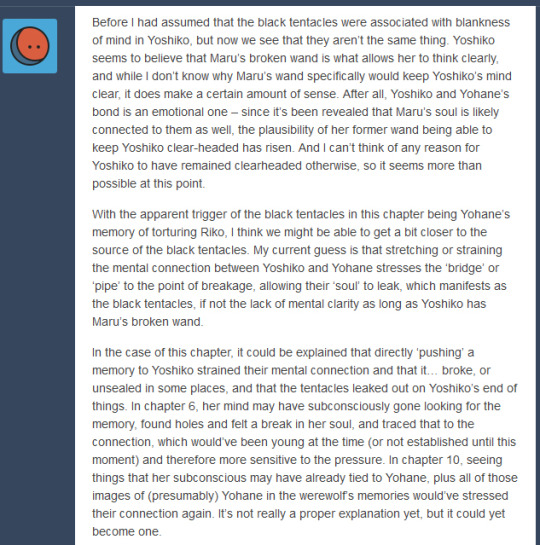
Specifically, it was Yoshiko’s emotional attachment to Hanamaru’s broken wand that stopped her from going berserk. To her, the broken wand was a remnant of the ‘old’ Hanamaru, from a period of time where things were still good. As hinted in past chapters, being the one to be able to approach Yoshiko while those tendrils were rampant, Hanamaru is a key factor in calming down Yoshiko. Emotion is another key catalyst for the black tendrils. Finding out that Yohane had tortured Riko caused such undulated anger in Yoshiko. Clues from past events will be accumulating and adding up, and of course more to come. Good speculations, that’s all I can say for now 😃
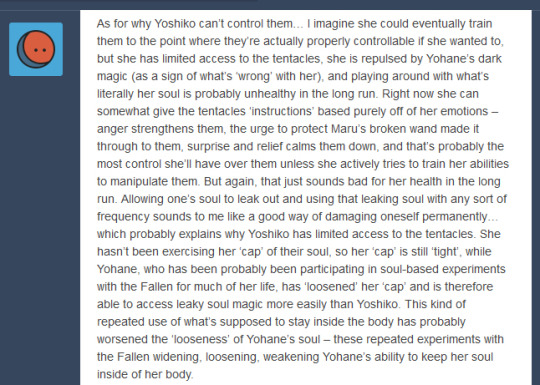
Yup, playing around one’s soul definitely isn’t healthy for the long run, especially when you use said soul fragments as a form of weapon or defense. In a way, you could say Yohane-Yoshiko are damaged already. Neither of them is whole after all. Again, great speculations!
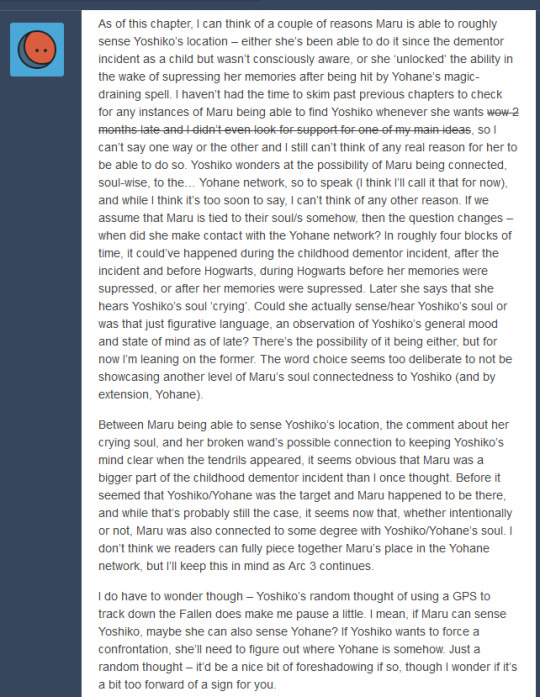
Hanamaru is connected to Yoshiko in a way, ever since the Dementor incident as a child. (ch17 sheds some light onto that mystery) She hasn’t been aware of this connection, at least not consciously, but she’s always been able to locate Yoshiko at Hogwarts (between classes and whatnot). After the Chamber of Secrets event though, she becomes aware of it without understanding what it really means. Seeing the Augurey enables her to make a comparison/metaphor, and so she stated that she could hear Yoshiko’s soul crying.
Foreshadowing… welp, ch17 did reveal more things haha
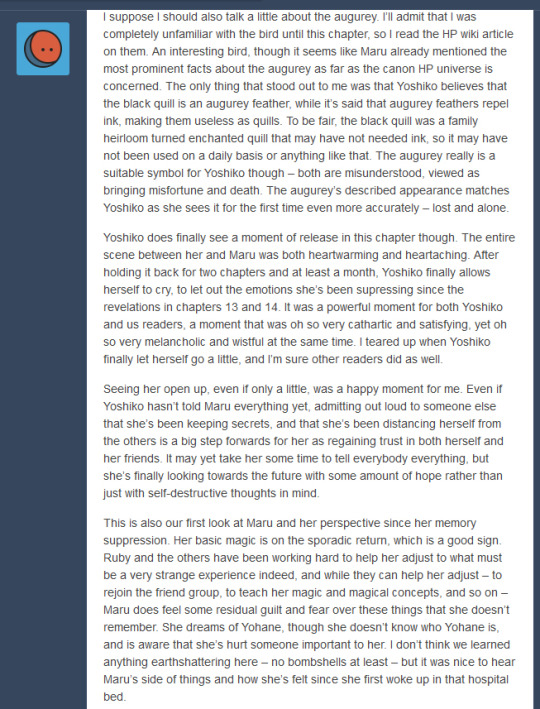
I’ve been fascinated by Augurey since I first read Fantastic Beasts and Where to Find Them, which listed them alphabetically. So in the very early planning stages of this story, I thought of Yoshiko right away and wanted it to play a significant role. Ch17 does reveal more than it being a symbol. The Hogwarts registry that writes down the names of magical children is an Augurey quill, that’s why I chose to use it for a purpose in this story as well.
Just as how Professor Koizumi coaxed Ruby into letting out her emotions in Interlude2, Hanamaru managed to do so for Yoshiko. The poor girl needs it, it’s not healthy keeping everything inside after all. It’s mostly guilt, she keeps telling herself she doesn’t deserve to be comforted and she’s in no position to be crying when everyone else have suffered so much more. I’m glad that you as a reader find the moment satisfying, as I intended it to be in spite of the overall solemn and melancholic tone. Ch17 presents a different catharsis for her, another one that she needs, and for Hanamaru as well.
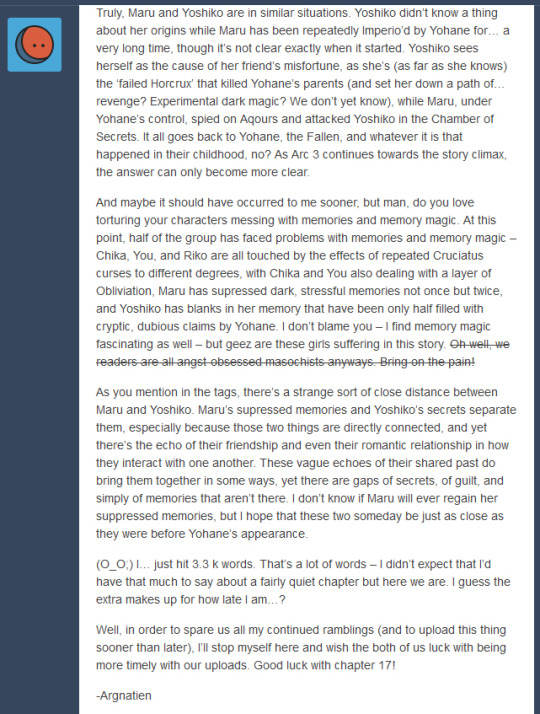
<_< ah yes memories. I’ve always found Obliviate a very fascinating spell – a dangerous one too – yet it was never expanded much in the HP canon. The most poignant instances would be Gilderoy Lockhart stealing credit, Hermione to protect her parents, and Bertha Jorkins who got tortured by Voldemort and regained her memories. All of these have different impacts, positive and negative, on characters and the plot.
And so, I did a little variation amongst the members – the Memory Charm saved You and Chika’s lives; Riko extracted her memory into the Pensieve before her mind cracked; Yoshiko’s own memories being disjointed due to the whole Horcrux issue; Hanamaru’s memory repression being purely psychological.
I make them suffer a lot don’t I… (but this is nothing compared to other AUs I had for them LOL *gets shot*) But personally, I find things so much sweeter (or, bittersweet at least) if there was suffering beforehand. The saying of ��you won’t realize how much you miss/need something until it’s gone’ kind of feel.
Again, I must say I’m beyond amazed at the 3.3k review. Like, holy moly, that’s longer than most some of my blips already! I really appreciate all these feedbacks though – it lets me see how a reader views the story, and it brings me joy to see the little nuances here and there noticed and appreciated. I’m also glad to elaborate upon/share the more intricate details that have no room in the storytelling.
Thanks again!
#argnatien#LLSHP AU#3.3k *mind boggled#m-my reply is 1.5k#athyra rambles#raaaaaaambles#some background/makings-of(?) stuff#hmm should I make a post about Patronus now that the cast is complete?#also fixed the typo and the link LOL#it's for ch16
12 notes
·
View notes
Text
I have, once again, started up an online relationship of sorts. This time it’s with someone I know in real life though. It’s with that hippie chick Angela, with whom I camped at the Philadelphia folk festival back in 2008. There is one major obstacle that prevents me from trying to make it happen (she already said she would be willing to move back to Philly so we could be together). It’s a huge one too…she has a major drug and alcohol addiction. Like, she takes heroin every day. She also takes a shit load of other prescription drugs and drinks booze the way I drink seltzer with key lime and cherry syrup. I told her she would have to be thoroughly clean for us to be together. I told her about Melissa and how her addiction almost cost me my sons…and how that shit will never be repeated. She wants to quit but doesn’t know how. Heroin is so difficult to give up, due to the withdraws and whatnot. Behind that skinny junkie face is still that beautiful hippie girl I met 12 years ago. She still has it. Oy…but there are other things too. She is schizophrenic (oy…why?!) She told me she hears voices and heroin is the one thing that stops the voices…Kent told me the same thing. It also explains why she believed in the reptilian people are ruling the world until I pointed out to her that this belief is literally nothing more than recycled and repackaged anti-Semitism. She told me she then looked into it, and realized I was correct and she was wrong (well der). So many red flags…but it’s so hard for me to not care about someone who cares about ME. Plus, when I met her 12 years ago she was mind blowingly hot. Like, she could have been a model, only she was into great music, homemade Indian skirts and doesn’t intimidate the hell out of me. Yeah…I know it’s a terrible idea to base anything from over a decade ago. With all the flaws she has… she has a few things going that I really like. She digs me in a big way. A real woman who wants to talk to me. She wants to be with me. Appreciates me for the person I am. She’s a self-described freak in bed. She talks dirty when in the mood and says she into…pretty much everything. We were video chatting last night and she flashed her boobs twice. Both times totally unsolicited. I have never video chatted with a woman who flashed me in almost 20 years (the only other time was this random fat chick whose name I don’t even remember. She was Cuban and living in Texas…and I was still living at my parents’ house in St. Davids at the time). It’s hard for me to reject her when she represented a fantasy for me for years. The non-judgey beautiful hippie. Now…I also have a little guilt in that my buddy Jerry used to date her, and is still in love with her to this day. She told me all about when she moved with him in Oregon for like 36 hours. He lives in a one bedroom 2 room apartment. He gave her a dirty inflatable mattress to sleep on and didn’t take it well when she said she was there to get clean, not have sex. Now…I take what she says with a pinch of salt. Junkies are not well known for remembering things as they really happened. Jerry told me he told her she had to leave when he caught her ordering a shit load of Ketamin to sell in order to get going in finding her own place. Do I believe that? Oh lord, yes. Did Angela mention that part in her story? Oh lord, no. Yeah…it’s a terrible idea for me to get involved with Angela. I know. But the longer I am ignored by every other woman I try to form some kind of bond with, the more my standards get lowered. That Jen Jones chick hasn’t responded in days and I’m pretty much assuming it’s a lost cause (I won’t write again. If she wants to contact me, she’s welcome too). Sasha still sends a message to me every once in a blue moon. I sent her a message a few weeks ago that she looks beautiful in a pic with her son. She just said “thanks”. *heart drop*
Ugh…and that Juliana/Rachael chick. Oh man. As I suspected, she is a catfish. She did write back to me yesterday though. She suddenly fesses up that the “Michael DeWayne Johnson” whose name appears when you look up her phone number on snapchat…and is almost identical to her username (rwalls0198 and mjohnson0197). She suddenly said that this Michael guy is her boyfriend and she’s been trying to turn me into her side piece. She couldn’t explain the “coincidence” of their usernames being almost identical, she said she wouldn’t take any gifts from him because he’d use it against her when I asked her why can’t he buy her a new cell phone. She also tried to claim that I was full of drama by my reaction to getting catfished. I responded with “So, let me get this straight. You lied to me about being single, you purposely wanted me to mail you a new phone using your boyfriend’s address specifically to cause drama, you won’t be straight with me as to why there is no record of your existence anywhere, the camera on your phone has been conveniently broken since the first week we met (like 10 months ago) and you have been pushing me to buy you a $200 phone for months now…and I’m the one full of drama!?” She then said “do you want me to dump him for you? I’ll do it”. I was all “What?! No way! Not for me. If you really don’t trust him and feel like he has ulterior motives, you should dump him for you”. I also asked what her real facebook page is. She claimed I knew it already. But I don’t buy that. Every single person on her facebook and Instagram are middle aged men like me who only comment on how hot she is. No friends, no family, she’s never tagged in anyone else’s pics and all the accounts are newly opened. All hallmarks of a scammer. I told her this too. She insists she’s not a scammer and will prove it to me by using someone else’s phone to video chat with me. Suuuuuuuuuure honey. You do that. Oy.
This fucking world…everything is becoming so intense. Things that really shouldn’t be political are becoming political. Wearing a freakin’ mask in public is becoming political. That’s so fucked up. COVID cases are skyrocketing all around the country, yet the government just can’t keep us all Quarantined any longer. The divide between the right and the left is getting so wide it almost feels pointless for us to continue with the Union. I go on right wing political pages and some of the memes I see are so over the top hyperbolic, use painfully obviously false comparisons, use a strawman argument or just misses the point entirely. Yes, there are plenty of idiotic left wing ones too who do similar things. But, there is a noticeable difference. Most of the left wing ones criticize actions that have actually taken place. The right’s criticisms are usually just total speculation. Things they assume are going to happen. (you know, like “taking all our guns away” “making Christianity illegal” “socialism will lead to collapse (then only use military dictatorships as the example)”. I just get annoyed when the left uses bullshit when there’s so much real things to be pissed about
0 notes
Text
The Book Ramblings of February and March 2019
In place of book reviews, I will be writing these ‘book ramblings’. A lot of the texts I’ve been reading (or plan to read) in recent times are well-known classics, meaning I can’t really write book reviews as I’m used to. I’m reading books that either have already been read by everyone else (and so any attempt to give novel or insightful criticisms would be a tad pointless), or are so convoluted and odd that they defy being analysed as I would do a simpler text. These ramblings are pretty unorganised and hardly anything revolutionary, but I felt the need to write something review-related. I’ll upload a rambling compiling all my read books on a monthly basis.
Alice’s Adventures in Wonderland and Through the Looking Glass, and What Alice Found There - Lewis Carroll I am a jammy fucker, and so when faced with all of the editions of Alice in Wonderland that I could have bought, I had to go with the deluxe edition of The Annotated Alice, because it’s big and fancy and I could get my fill of cheeky secondary reading from it. However, upon purchasing it I realised that there is definitely a line that needs to be established when it comes to analysing books like this, and you’ll have to forgive me for repeating some of my thoughts on Peter Pan in this ramble, because my thoughts are much the same for both texts. Unlike Chesterton, who fought against the scholarly intellectualisation of Carroll’s works, as well as giving us the great quote on the subject, ‘Alice is now not only a schoolgirl but a schoolmistress’, I think that there can be benefits for reading Alice with a scholarly eye, especially when focusing on Carroll’s own life and outside influences of his that may have explicitly affected the writing of the stories. (Brief side note, I’ll stick to referring to the author as Carroll as opposed to Dodgson in this ramble, for simplicity’s sake). Whilst I do think that there are a lot of annotations in this book, which I will consider representative of fields of study done on the subject of Alice, only vaguely relevant and interesting in a detached way from the overall narrative, just additional embellishments to the reading rather than explicitly making the stories better to read, I’ve still got time for them because such extra tidbits of information are interesting in their own right. Of course, sometimes the information tidbits aren’t as interesting as what Carroll did with them - why would I care to read the sensible proper versions of verse extracts that Carroll changed into nonsense verse when it’s the nonsense that’s far more entertaining? - but, again, it has its use. What I do have qualms with are the annotations attempting to over-intellectualise the nonsense aspects of the story with real-life physics or mathematics application, retroactively attributing theories and shit to Carroll’s formulation of his nonsense and judging the nonsense by the sum of its (supposed) parts, and of course it’s awful when the annotations spend paragraphs upon paragraphs comparing the twenty billion different drawings of Alice within the framework of Carroll’s hatred of crinoline fashion. That shit can bugger right off. But let’s actually talk about the stories. These stories are, if not the first, than certainly the definitive examples of literary nonsense, and what proved most interesting to me was how said nonsense specifically manifested itself for comedic effect. Alice’s straightforward thinking and no-nonsense attitude (no pun intended) to all the kooky shit around her is always fun, and this book deserves kudos for its bold strides in the direction of really dark comedy in a children’s book. Similarly to a lot of people, I was familiar with the Alice nonsense before reading it, thanks to the 1951 Disney film and the sheer ubiquitousness of the stories’ content in pop culture, but it didn’t make it any less fun to read. I know that this is far from a novel takeaway, but there’s some things in a written text that a film just can’t capture; the writing has a fantastic way of being able to gloss over Alice’s low moments to firmly cement her as a fearless protagonist who accepts all the challenges thrown her way head-on, whereas the film needs to cover every low point in the story with heartstring-pulling poignancy. This is helped greatly by the fact that we know that everything will turn out alright in the end, either because the tone conveys it or because Alice explicitly tells us; there’s strife and peril along the way, but there’s no real risk of the whimsy giving way to any real danger, and so the story can just revel in its nonsense. Reading how Carroll describes all his fun Wonderland nonsense is, of course, incredibly enriching and fun; going into the story, I was expecting a lot from such well-known characters as the Caterpillar or the Cheshire Cat, and was subsequently surprised to see how little they actually figured into the overall story, but this gave way to the inclusion of scenes and nonsense I hadn’t seen before, like the tart debacle in the Queen’s Court. I was advised by a friend to leave it a while between reading Wonderland and the sequel, Through the Looking Glass, because the novelty of the nonsense would lessen were I to read them one after the other, and whilst I agree with his advice I feel that there is so much overlap of content between the two stories (especially considering how the film adaptations pick and choose story elements from both stories) that the new story wasn’t the completely novel experience I was hoping for. Whilst Wonderland didn’t have much of a story structure, with events unfolding and characters appearing as the story went along, there is more of a structure to Through the Looking Glass, however loose it may seem. This structure is that of a chess game, a fact I am left in little doubt about on account of the annotations giving me a constant fucking running commentary of the game’s progress, a progression which only ties into the story in terms of the characters’ idiosyncrasies in a humorous way once or twice in the whole fucking story. I know very little about chess, so any complex nonsense surrounding that fell way the fuck by the wayside when I was reading this, and therefore I was grateful that the usual Wonderland nonsense persists; my favourite encounters are the ones that reflect Carroll’s academic interests and experimentations, including a really interesting discourse on semantics and nominalism held by by none other than Humpty fucking Dumpty. WOULD I RECOMMEND?: YES
The Third Policeman - Flann O’Brien Nonsense writing is a fun concept to me, but my introduction to the genre, and indeed my full understanding before reading this book, was limited to texts by Carroll, which, don’t get me wrong, are of course great nonsense texts, but are familiar to us on account of how ingrained they are in pop culture, and thus you go into them knowing what to expect. I had no fucking idea what to expect from this book, and what I got was great. The story follows a chap with no name getting embroiled with a station of bizarre policemen, a vague setup into which is slotted in subplots about a league of one-legged men, inter-dimensional maps hidden on the ceilings of innocuous bedrooms, colours that make one go mad, and a conspiracy involving men taking on the attributes of bicycles and vice versa. This is supplemented with our narrator linking the banal sights and sounds around him to the speculations on said subjects by the insane savant writer de Selby, leading to pages upon pages of footnotes talking about de Selby’s ideas on bottled darkness or the world being shaped like a sausage, and all the contrasting and fucking ridiculous critical responses and hypotheses about said de Selby nonsense. I don’t need to tell you that this is all fucking amazing stuff. Not only is it always fun, it is described frankly and without laughing at itself, and while there is a lot to keep one occupied, it never gets overwhelming (or at least, the density of nonsense content in the prose never weighs on one’s brain in an information overload). The story is short, but dense with nonsense as mentioned above, and the fact that the few events that do progress the plot occur without warning nor aplomb is perhaps forgivable, because honestly the plot isn’t really the point as much as it is a vague backdrop for the nonsense at hand. All the way through it we have our nameless narrator, who challenges the farce around him but not incessantly or obnoxiously, and has a great patience for the shit he has to endure, greeting every new slab of ridiculousness with a polite nod and a smile; it’s very easy to align with the narrator without feeling like your interests clash with his. What I will say about this book is that, whilst it is purportedly many different things, from a murder mystery to a love story to an allegorical tale of guilt and despair, the sheer quantity of its bullshit means that it cannot be any of said things effectively. As a murder mystery, the plot hook that sets the pieces in motion for the circumstances of the murder is swiftly forgotten as the story barrels onwards. The love story element, whilst being ridiculous because it’s between our narrator and a stolen bicycle, is just one minor element of our narrator’s journey and is only dwelled upon for as long as it takes for the story to travel onwards to the next wacky plot thread. And as an allegorical tale of guilt, any attempt at inspiring guilt or sadness or whatnot is immediately offset by the knowledge that you’re reading a book with sentient bicycles and robes made of woven wind and policemen who refer to a difficult-to-solve problem as ‘an insoluble pancake’. This point does, however, bring us to the ending, which I will not explicitly spoil, but I will say that a) it does come as a surprise, but b) it pretty much juxtaposes the spirit of the entire work, and as such I thought it was a bit of a cop-out (no policeman-related pun intended). A thought-provoking cop-out that came as a bit of a shock, but a cop-out nonetheless. WOULD I RECOMMEND: HELL YES
Complete Stories - Clarice Lispector I like to review books based on whether I have personally got something out of them, and I am subsequently at something at a loss with this collection; as much as there is to recommend in the short stories of Lispector, they’re really not what I, or indeed those who know me, would consider to be ‘my thing’, and so my recommendations for the book may come across as a wee bit disingenuous. But let’s talk about these stories anyway. Lispector’s thing is incredible prose, almost prose poetry in some stories; it is florid and it is evocative and it is captivating, describing the emotions and thought processes of the narrator characters with such zeal and passion and complexity and verbosity. On this basis alone, I can recommend her stories, and presumably also her novels, to which I understand follow the stories in similar ways. However, I myself am loathe to pick up a novel from Lispector, because I find her short stories draining enough; I don’t mean this in a negative way, please simmer down and let me finish. These are incredibly dense short stories, with pages upon pages breaking down and analysing thoughts and feelings, snapshots of life extrapolated on and made to seem like powerful life-changing moments, the grand momentous prose depicting something as banal as a misinterpreted situation or a moment of embarrassment as cataclysmic disasters or mind-boggling enigmas to be contemplated by the finest philosophers. Only once could I sit back and laugh at this (the story ‘The Chicken and the Egg’, if you’re interested); for the rest of the time, I was fully and unequivocally invested in the strife and troubles described in these stories. But that’s not to say that they don’t take a toll. It took me quite some time to read this anthology because, were I to sit down and read these stories one after the other, I feared that the emphasis, the fucking punch that these stories had would become saturated, and it would just be a weary slog through turgid prose. I asked my friend (i.e. the bloke who gave me this anthology) why he considered the novels of Lispector to be some of the best he’s read, and he said that he loved how Lispector could pack seemingly everything into the world, every issue and matter and question and philosophy, into such small events; I won’t argue that Lispector excels at this, but I will protest having to read an entire novel’s worth of it, because I don’t have the patience nor the willpower. Anything else that I can think to say about the stories pales in comparison to Lispector's major strengths, but I’ll say what I’ve got anyway lest anyone were to accuse me of half-arsing these rambles. Some of the stories are unflinching examinations of the darker side of human nature, whilst others sacrifice this rumination for succinct twist endings and a black comedy tone; whilst I am fond of these stories, it can be a tad misleading or even anticlimactic when some stories set themselves up as examinations of curious human nature only to change course at the last second for the sake of the comedy twist (see ‘A Chicken’ for a good example of this). Though I scoffed at the suggestion of such in the introduction, believing it to be too much like base-level GCSE-tier literary analysis, the focus (and to an extent style) of Lispector’s works do noticeably change as she gets older; her earlier works are often first-person stories about love and confusion and vanity, but by her collection Covert Joy her stories are often framed around nostalgic or formative experiences. I prefer Lispector’s earlier stories; they’re more representative of the amazing storytelling I’ve been gushing about for this entire ramble, whereas her later stories are told like wistful recollections, good in their own right but not what I think of when I think of Lispector. I’ll recommend my favourite stories (in the order that they were printed in my collection), with the caveat that not all of these stories are good because of the reasons outlined above: 'Obsession', ‘Daydream and Drunkenness of a Young Lady’, ‘A Chicken’, ‘Happy Birthday’, ‘The Smallest Woman in the World’, ‘The Dinner’, ‘The Solution’, ‘The Fifth Story’, ‘Covert Joy’, ‘Remnants of Carnival’, and ‘Where Were You At Night’. WOULD I RECOMMEND?: YES
The Warden - Anthony Trollope I was a tad ill at ease as I started this book and started discovering some startling truths, most notably that I had been deceived once more into reading something out of my comfort zone. All I knew about Trollope going into this was his misplaced pride in his disgusting beard, but the introduction to the story cheerfully informed me that Henry James had referred to his ‘complete appreciation of the usual’, whereas Carlyle had more scathingly called him ‘irredeemably embedded in commonplace, and grown fat on it’. I was here for larger-than-life characters embroiled in a grand scandal in a sleepy cathedral town, perhaps some boisterous near-deaf old men or some juicy satire about lascivious priests, but I’d only gone and signed up for a quiet and relatively uneventful novel of everyday folk embroiled in quiet affairs! What a fool I am! However, whilst I worry that by saying this I am resigning myself to walk down the long path of boring realism-centric literary classics that I have long reviled, I’ve got to admit that this book is really rather good. Trying to describe the plot may very well deter any prospective readers in much the same way as it initially repelled me, but the general gist of it is a scandal coming to light (or, more accurately, being somewhat fabricated and blown out of proportion) involving the distribution of charitable funds in an almshouse in the quaint cathedral town of Barchester, and the story follows the main people who become embroiled in the affairs, either because they started it or because they’re under threat by it. You’d be forgiven to gloss over this as a load of old banal quotidian twaddle, but where this book shines is in its storytelling. The narrative voice is warm and affectionate, the characterisation is fucking stellar, and the story getting into the minds of its characters with every encounter and fantastically describing how events unfold for different people is all bloody incredible. It is perhaps the warm and inviting quality of the storytelling which results in this not being the most effective of satirical texts, because satire requires you to step back and think about what you’re reading and why it’s funny, whereas beyond recognising a few real-world allusions (my favourite of which is Mr Popular Sentiment, Trollope’s less-than-complimentary imagining of Charles Dickens), you as the reader think and react along with the characters rather than from a lofty distanced position, and the material that you find funny is funny in-world rather than necessarily because is aptly reflects real-life folly or works in some other meta-textual way. The warmness of the story which, at its heart, is a story of an old man trying to do right by his morals and his friends, doesn’t really allow for the most dramatic of plot resolutions, and indeed this book displays some rather odd choices in its pacing of such plot resolutions. Things are established as relatively chaotic in the storyline, with different characters with different motivations striving away and characters with the same motivations approaching their problems in different ways to overcomplicate the affairs at hand, but ultimately there is little payoff for all these hectic antics. The law suit that sets the plot in motion is established to have been poorly founded and generally worthless from the get go, which isn’t a problem in of itself because the titular warden’s guilt about the matters of the law suit are well-founded even if the law suit is not, but the law suit is dropped without fuss and without any serious consequences around halfway through the book, despite all the elements at play and the goings-on behind the scenes that led to the law suit being dropped. The warden’s story ends without fuss or without anything particularly dramatic happening, save a few heated debates and incredulous blustering figures imploring him to reconsider his choices, and overall just seemed a bit empty because of the lack of any real stakes. The actual ending was at times very poignant (and without any real clue as to how things may be resolved), and at times a tad rushed to tie up its loose ends and get in a bit more quaint narration endearing the characters of the story and speaking regrettably of leaving this story to face times to come; I suppose this somewhat reflects the book’s content, if perhaps losing sight of the life-affirming nature of it, and it is if nothing else bittersweet. By fuck it’s going to make me read the next book in the series to see what happens to these lads next, because hell yeah there’s a series of these. WOULD I RECOMMEND?: HELL YES
Dead Babies - Martin Amis I was cognisant of the preponderance of texts that I’ve been reading recently being all warm and powerful and life-affirming, and therefore I decided to read this and Wilt for a mindless black comedy experience. This was perhaps not the most mind-numbing of reads, being a rather fucked up book, but it’s a bloody good read regardless. Amis’ writing is absolutely incredible; his strengths lie in giving life to abstract scenarios and feelings with evocative metaphors, and characterisation that is complex and beautifully written. With this writing Amis paints a picture of a fucked up urban setting, a setting that I would attempt to succinctly summarise but know in my heart that to try would only be to amateurishly ape Amis’ own fantastic scene-setting descriptions, and so I will instead merely say that it is fucking good. It works because it’s a very grim setting, but it is also curiously sensationalised, while still being grounded in its grim content; there are gangs of cold calculating men who perform elaborate synchronised morbid atrocities, there is a pseudoscientific drug-mixing station with different uppers and downers to chemically alter or emphasise any aspect of a person’s character, and one of the main characters is a grotesque dwarf with nails digging into his feet from shoddily-constructed platform boots and a collection of grotty vintage porn magazines. Everything is primal or gross or part of some sort of beautiful chaos, and it’s an incredible hyperbolic depiction of society’s seedy underbelly, reminding me at times of A Clockwork Orange. The powerful narrative voice lends the grotty and grotesque setting a touch of high-mindedness or high society flare. The characters make up a fun array of misfits, from the pathetic to the neurotic to the braggart to the horrifyingly fucking villainous, and with a small cast of characters we get to learn everyone’s opinions of one another and how they bond, which was surprisingly well done considering how diverse and angsty all of them are, and pleasantly surprising that they don’t all just genuinely hate each other because of how different they are from one another. The narrative voice also helps out here; its direct commentary on the main narrative reminded me of Trollope, but this is not narration to warmly speak of the characters or implore the reader to think upon them positively, but rather to remark with grim resignation the actions of the characters or the shitty direction their lives are taking them. And now we come to the tricky subject of comedy, a tricky subject because some people will no doubt argue that this book is too fucking awful to be considered as such. The setup of the story seems like Trainspotting, a grim world periodically ameliorated with little scenes of light-heartedness and comedy, and at the start of the book it’s easy to laugh at the vileness of of the characters’ actions. As the book goes along, however, the narrative moves from the overall setup of a debauched weekend of dissolute youths to being determined by the dramatic actions of the characters, spurned by simmering emotions (and sometimes catalysed by large quantities of experimental drugs) and often ending very very poorly. It is here that some of the more disgusting plot points of the story occur, and yet interjected into it are elements of farce so ludicrous that you have no recourse but to laugh at them in the face of all the horrors surrounding it. Or maybe that’s just me. WOULD I RECOMMEND?: HELL YES, IF YOU’RE IN THE MOOD FOR SOME FUCKED UP SHIT
Wilt - Tom Sharpe This may well be my shortest book ramble to date, and indeed I deliberated whether or not it was worth writing, simply because it is another example of books that I’ve liked in the past and continue to enjoy. There’ll probably be a bit of a crossover between this ramble and my ramble on Roald Dahl’s short stories, as their black comedy content has much in common. This is a relatively short book that takes you on a pretty wild fucking journey of farce; ridiculous situations and misconstrued motivations abound, and even from the confines of a prison confinement our eponymous protagonist is able to escalate the plot like you wouldn’t fucking believe. The general premise, such as it is, revolves around an uneasy marriage of a domineering wife and a put-about unmotivated husband who humours himself with elaborate dark fantasies of murdering her, and the plans of actualising these fantasies (catalysed in part by some villainous Americans) spirals into all sorts of wacky shenanigans that I shan’t spoil. I went into this book at a friend’s recommendation, and at around one hundred pages in I commented that there are parts of the story that veered too far into plain old cringe, and that overall the story seemed to be shaping up to a rather vengeful story written as the author's attempt to vent frustrations. My friend said that Sharpe was ‘playing [me] like a pipe’, and so I persevered, and can subsequently say that all such thoughts are swiftly quashed by the rest of the book, which is an absolute tour de fucking force of fantastic time-wasting and nonsense that leaves all that real-world cringe or vengeful thoughts of worldly injustice behind. And of course we get a satisfying life-affirming ending, because this is that sort of book; everything’ll be resolved in the end with smiles and ironic twists. This isn’t exactly a book with incredibly florid prose or life-changing writing, but what it is is a book written by an incredibly smart person, which is instrumental in shaping this book’s fucking fantastic (and often dark as fuck) comedy, contributing some phenomenal turns of phrase, and as a source, much like Dahl, of a hundred throwaway references to miscellaneous academic tidbits that Wilt employs in his endlessly hilarious time wasting. WOULD I RECOMMEND?: YES
Other shit that I read that I couldn’t be arsed to ramble about: Shakespeare’s Local by Pete Brown (conspicuously NOT about Shakespeare’s local pub but nonetheless about the long history of my all-time favourite pub (The George in Southwark), funny and informative (if noticeably written by a man who is not a specialist in some of the subjects he talks about, for people who are also not specialists in said subjects), would recommend if you can go down to the George and have a pint there while contemplating the history) and Green Men and White Swans by Jacqueline Simpson (a great and informative book with a subject matter seemingly tailor fucking made for me, greatly enjoyed Simpson’s none-too-subtle asides about peoples’ over-intellectualising of pub names, was mildly disappointed that my own home town has got fuck all in the way of cool folklore-inspired pub names, would absolutely recommend alongside a cheeky bev).
#book reviews#book rambles#alice in wonderland#through the looking glass#lewis carroll#wilt#tom sharpe#dead babies martin amis#the third policeman#flann o'brien#clarice lispector#the warden#anthony trollope#i had a load of great ideas in mind for my usual nonsense wittering in the tags but i've totally forgotten all of my great ideas#what an absolute piss take#i really need to be writing my essay right now
0 notes